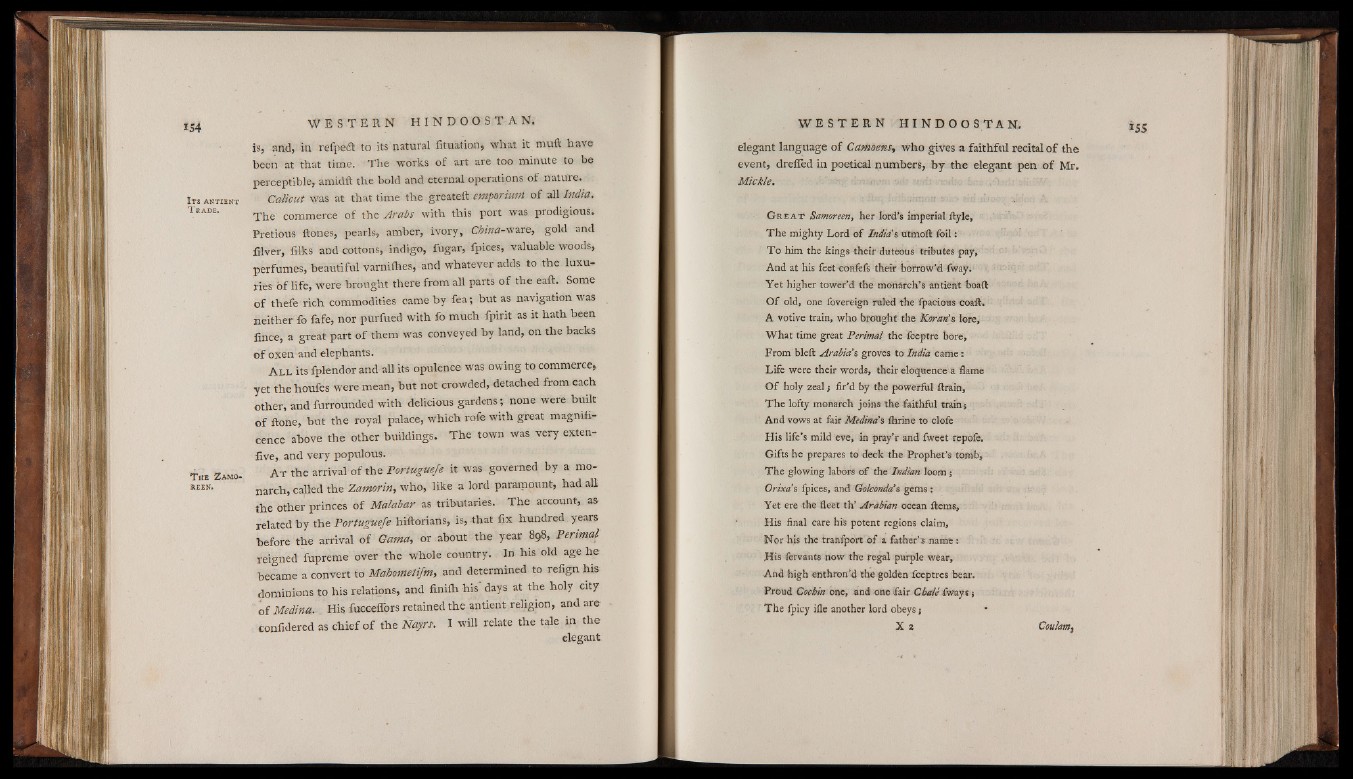
is, and, in refpedt to its natural iituation, what it nauft have
been at that time. The works of art are too minute to be
perceptible, amidft the bold and eternal operations of nature,
i t s a n t i e n t Calicut was at that time the greateft emporium o f all India.
T r a d e . The commerce of the Arabs with this port was prodigious.
Pretious Rones, pearls, amber, ivory, China-ware, gold and
filver, filks a n d cottons, indigo, fugar, fpices, valuable woods,
perfumes, beautifu l varniihes, and whatever adds to the luxuries
of life, were brought there from all parts of the eaft. Some
of thefe rich commodities came by fea; but as navigation was
neither fo fafe, nor purfued with fo much fpirit as it hath been
iince, a great part o f them was conveyed by land, on the backs
o f oxen and elephants.
A ll its fplendor and all its opulence was owing to commerce,
yet the houfes were mean, but not crowded, detached from each
other, and furrounded with delicious gardens; none were built
o f ftone, but the royal palace, which rofe with great magnificence
above the other buildings. The town was very exten-
five, and very populous.
T he Zamo- A t the arrival of the Fortuguefe it was governed by a mo-
*EES' narch, called the Zamorin, who, like a lord paramount, had all
the other princes o f Malabar as tributaries. The account, as
related by the Portuguefe hiftorians, is, that fix hundred years
before the arrival of Gama, or about the year 898, Perimal
reigned fupreme over the whole country. In his old age he
became a convert to Mabometifm, and determined to refign his
dominions to his relations, and finifh his days at the holy city
o f Medina. His fucceifors retained the antient religion, and are
confidered as chief o f the Nayrs. I will relate the tale in the
elegant
elegant language of Camoens, who gives a faithful recital o f the
event, drelfed in poetical numbers, by the elegant pen o f Mr.
Mickle.
G r e a t Samoreen, her lord’s imperial Ryle,
The mighty Lord of India’s fftmoft foil:
To him the kings their duteous tributes pay,
And at his feet -confefs their borrow'd fway.
Yet higher tower’d the monarch’s antient boaft
Of old, one fovereign ruled the fpacioas coall.
A votive train, who brought the Koran’s lore,
What time great Perimal the foeptre bore,
From bleft Arabia's groves to India came:
Life were their words, their eloquence a flame
Of holy zeal; fir’d by the powerful ftrain,
The lofty monarch joins the faithful trains
And vows at fair Medina’s ihrine to clofe
His life’s mild eve, in ptay’r and fweet repole.
Gifts he prepares to deck the Prophet’s tomb,
The glowing labors of the Indian loom ¡
Orixa’s fpices, and Gokonda’s gems:
Yet ere the fleet th’ Arabian ocean Rems,
His final care his potent regions claim,
Nor h>s the tranfport of a father’s name :
His fervants now the regal purple wear,
And high enthron’d the golden fceptres bear.
Proud Cochin one, and one fair Chalé íways ¡
The fpicy ille another lord obeys j
X 2 Couiam,